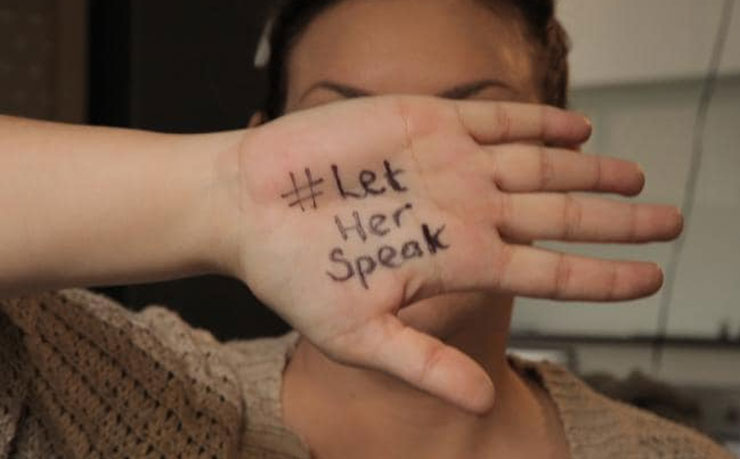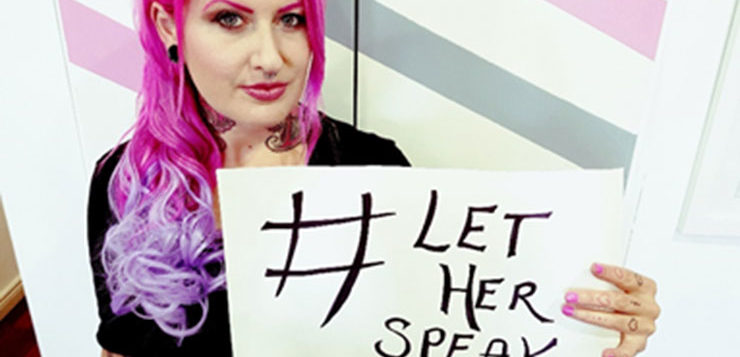In April, Tasmania amended its archaic sexual assault victim ‘gag law’. Now, as the Northern Territory considers amending a similar law, Dr Zahra Stardust discusses the case of ‘Sandra’ – a woman who was raped while working at a buck’s party near Darwin in 2017 – who now wishes to speak out under her real identity, but is prohibited from doing so.
Over three winters I travelled to Darwin as a contract showgirl for the Honey Pot Club. Before we worked the night shifts, we would drive out for daytime pub shows around Winnelle, Howard Springs and Parap.
It was so hot that our make-up constantly melted and we did bath shows just to cool off. On a good day, we were booked to perform private shows at people’s residential homes for birthdays and buck’s parties.
As an X-rated stripper, it was protocol to lay out rules and boundaries in advance – no filming, no photos, no touch without permission. Life as a stripper was a lot of things.
Sexual assault was not part of the job.
When I heard about the adult performer who was sexually assaulted at a buck’s party in Darwin’s rural area in 2017 by a man using a beer bottle, I knew that could have been me. The offender, Kevin Willcocks (who stated at trial that he had “seen worse things” and was simply being “a larrikin”) was convicted in the NT Supreme Court in 2019 of rape.
According to news.com.au – the media outlet that first broke the story earlier this year as part of the #LetHerSpeak campaign – ‘Sandra’, the survivor, wants to speak out about her experience under her real name. But even though Willcocks was sentenced to three years and six months, suspended after nine, Sandra cannot identify herself due to a ‘sexual assault victim gag law’ that exists in the Northern Territory.

Last month the Tasmanian Government amended a similar ‘gag law’, following pressure from the #LetHerSpeak campaign, which first launched in 2018.
In the NT however, a person can still face six months imprisonment for publishing or making a statement or representation that reveals the name of a sexual assault complainant at any point in time, even if the complainant consents.
Although the original rationale for the shield provision was to protect the privacy and welfare of the complainant, it has the unintended effect of preventing a survivor of sexual assault from identifying themselves, which in turn can contribute to shame and isolation.
As both a sex worker and an academic, I know that sex workers face multiple barriers to accessing justice. Over the last three years I have been a researcher in a national study conducted by Scarlet Alliance and the Centre for Social Research in Health at the University of New South Wales exploring sex work stigma in Australia. Despite working in this space for many years, I was emotionally unprepared for the disclosures of sexual assault we heard from sex workers across the country, their poor experiences seeking justice, and risks created by the legal system itself.
Before even getting to court, sex workers were highly reluctant to seek police assistance if they were a victim of crime, citing instances where police did not treat their claims seriously; where police believed sexual assault constituted part of the job; or where police expected free services in return for not charging them for sex work offences.
Sex workers’ decisions to pursue redress were also influenced by news reporting about sex worker victims of crime (including murders of sex workers); where sex workers were treated as either less worthy, less rape-able, or a media spectacle; or in ways that were offensive and gratuitous.
This in turn was affirmed for sex workers when they turned to court decisions and judicial comments about sex workers, which assumed the psychological impact of sexual assault upon sex workers to be less than that for ‘chaste’ women.
When deciding whether to report, it was common for sex workers to weigh up the notoriously high attrition rates and low conviction rates alongside the emotionally draining educational labour required to convince police, judges or juries that sex workers could be victims of sexual assault at all.
When Sandra tried to attend open court hearings, she was accompanied by many supporters including her peers from the NT Sex Workers Outreach Project and the Sex Worker Reference Group (SWRG). When she could no longer hear the humiliating and derogatory slurs against her in the court room, sex workers set up a roster system for peer support to sit in on the hearings and, with her other friends, document the lengthy trials for her.

Numerous states in Australia are now reviewing their sexual consent laws to better reflect the experiences of sexual assault survivors. Some states have moved towards a communicative consent model and updated jury directions to require jurists to examine their own assumptions about who can be sexually assaulted. In some jurisdictions, where a person fraudulently misrepresents that they have paid a sex worker, this can constitute sexual assault.
In November 2019, the Northern Territory parliament responded to the collective calls of sex workers in the Territory and decriminalised sex work with the Sex Industry Bill 2019. It was a necessary move to improve the rights, health and safety of sex workers across the Territory, and one that will dramatically improve our ability to report assault.
Leanne Melling of SWOP NT says that decriminalisation is essential to prevent violence. Previously in the NT it was unlawful for a private sex worker to have any support staff or work with another sex worker. Melling states, “This crime against Sandra would have been prevented if Sandra was able to have security with her at the venue and been able to leave as soon as her job was complete with her driver. Now under decriminalisation, sex workers will be able to have support staff to co-attend any jobs such as Bucks parties where security is necessary.”
Gala Vanting of Scarlet Alliance, Australian Sex Workers Association, similarly believes that the leadership the Northern Territory has shown in aligning its sex work laws with human rights and global health frameworks models best practice.
In decriminalising sex work, Vanting states, “The Northern Territory has made a statement to other jurisdictions in Australia that sex workers must be able to access the same mechanisms of redress as all other citizens when crimes are committed against them, at work or elsewhere.”
Vanting believes that Sandra has the right to define what justice looks like for her as a survivor of assault, and says that there is more to do to ensure that the rights of all NT sex workers are protected from sex work stigma in other areas of law, including anti-discrimination.
The same month that decriminalisation passed, a Bill was tabled in NT Parliament to amend the existing Sexual Offences (Evidence and Procedure) Act 1983 to permit adult sexual assault survivors to be identified with their consent. In March 2020, following public submissions and hearings, the Legislation Scrutiny Committee tabled its report.
The Committee recommended that restricting the identity of a complainant until all proceedings (including appeals or re-trials) are finalised was “unduly limiting” and significantly weakened the Bill’s capacity to achieve its objectives of giving voice, autonomy and control back to survivors.
The Committee stated that this provision was out of step with other jurisdictions, and that complainants’ abilities to publish statements were still restricted by laws of contempt, suppression orders and advice of police, prosecutors and lawyers.
The report was welcomed by those advocating for reform, including the #LetHerSpeak campaign partners and the Right to Know coalition.

The law is slowly catching up with what sex workers have been saying for decades: sexual assault is not part of the job. Decriminalisation has recognised that sex work is work, but the protectionist rationale of the gag provision leaves no room for survivors who want to come out, speak up and tell their stories.
Survivors consistently report being re-traumatised by the legal process and robbed of their voices, becoming mere witnesses to the proceedings. But listening to survivors can reduce victim-blaming, promote responsible journalism, challenge stigma about sexual assault, share information about red flags and give others the courage to speak.
Sexual assault strips a person of their power. Letting survivors speak restores their agency, autonomy and control, and provides an opportunity for healing.
It’s time for the law to let survivors speak.
• If you or someone you know is impacted by sexual assault, family or domestic violence, call 1800RESPECT on 1800 737 732 or visit www.1800RESPECT.org.au. Sex workers can contact Scarlet Alliance, Australian Sex Workers Association on 02 9517 2577 or by visiting www.scarletalliance.org.au. In an emergency, call 000.
Donate To New Matilda
New Matilda is a small, independent media outlet. We survive through reader contributions, and never losing a lawsuit. If you got something from this article, giving something back helps us to continue speaking truth to power. Every little bit counts.




